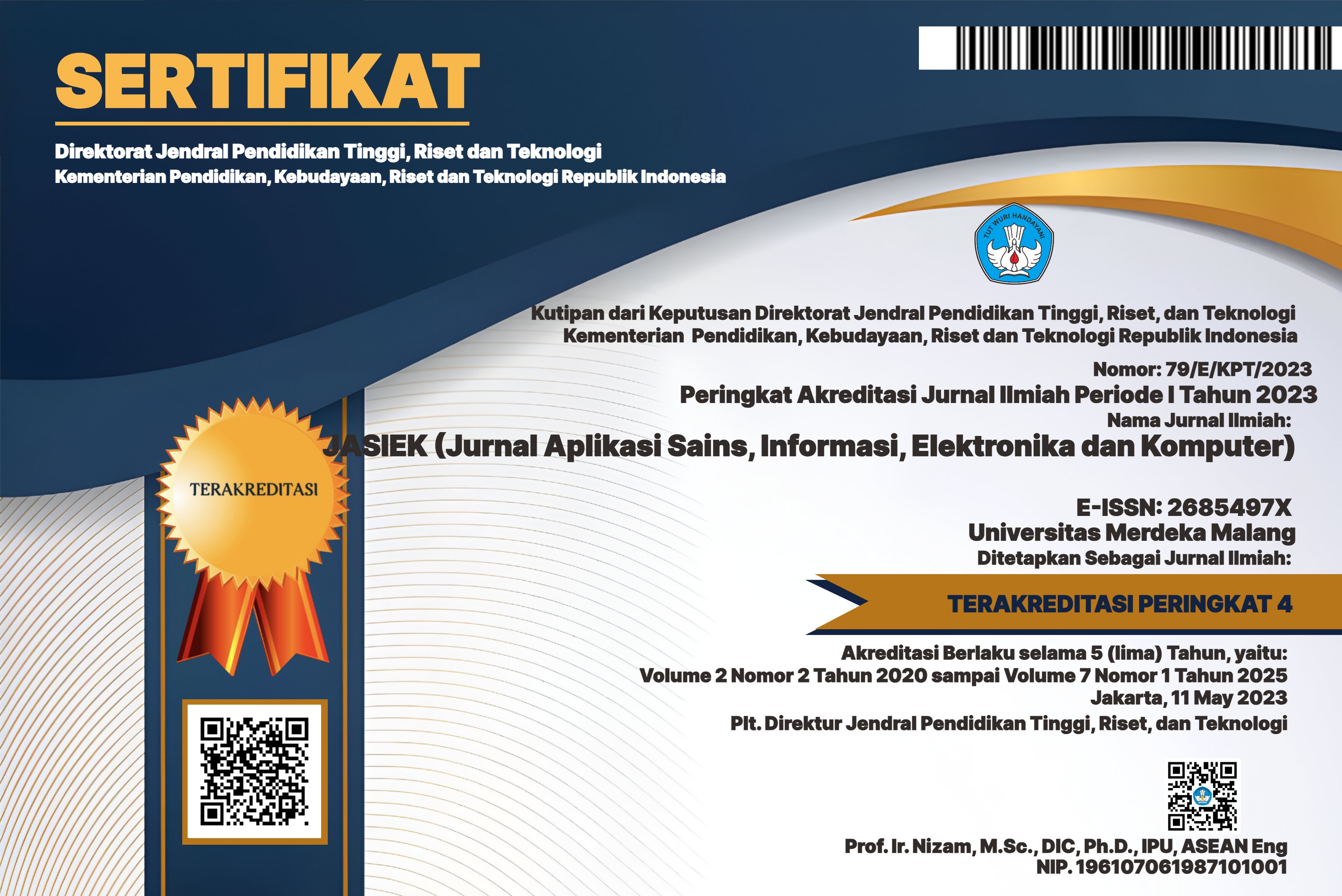Penggunaan Metode Technology Acceptance Model (TAM) dalam Analisis Sistem Informasi Alista (Application of Logistic and Supply Telkom Akses)
DOI:
https://doi.org/10.26905/jasiek.v5i2.11521Keywords:
ALISTA, TAM, System Design, System Ease, , System Acceptance Attitude, BehaviorAbstract
PT Telkom Akses Denpasar employees are assigned to provide and prepare materials in limited quantities and time. To be fulfilled, employees do work quickly including coordination, procurement, production, product supply, including daily administration and processing information from technicians to customers to make it easier to use the Alista application. Is the perception of interface design, system ease, system acceptance attitude, behavior of using the system measured by how much influence on the real condition of the use of the system that is trusted by employees. The method used to measure the results of research using TAM. Research sample of 78 employees. Based on the analysis results it is known that 35.2% of the four independent variables namely interface design, ease of system, attitude of system acceptance, behavior of system usage affects the real conditions of the use of information systems. The results of the respondents' scores were obtained from the results of a questionnaire from all respondents towards the variable of the question studied, the results of the TAM in the percentage of 44% of respondents' answers on average strongly agreed and 55% of respondents' answers agreed.Downloads
References
Davis, F. D. (1985). A technology acceptance model for empirically testing new end-user information systems: Theory and results. Massachusetts Institute of Technology.
Dewi, E. F., Pringgabayu, D., & de Keizer, H. (2023). Human Capital Management dan Technology Acceptance Model serta Pengaruhnya Terhadap Produktivitaskerja Karyawan pada Perusahaan Sektor Perkebunan. Jurnal Ekonomi Bisnis Dan Manajemen (EKO-BISMA), 2(1), 124–137.
Fitriyah, S. H. (2022). Penggunaan Metode Technology Acceptance Model dalam Analisis E-Procurement di Pemprov Jawa Barat. Jurnal Riset Ilmu Ekonomi Dan Bisnis, 147–156.
Geasela, Y. M., Hartono, H., Sutanto, D., Julian, K., & Setiawan, J. (2022). Analisis Sistem Informasi Web Penjualan pada PT. Teta Dengan Pendekatan Model TAM. JBASE-Journal of Business and Audit Information Systems, 5(1).
Ghozali, I. (2018). Aplikasi analisis multivariate dengan program IBM SPSS 25.
Laksmi, A. C., & Mardhatila, A. (2023). The use of the SIMDA application in accounting department at regional hospital Siti Fatimah Palembang. Proceeding of the International Conference on Accounting and Finance, 1, 129–134.
Lattu, A., & Jatmika, W. (2022). Analisis Kepuasan Pengguna Terhadap Penggunaan E-Learning Dengan Metode Tam Dan Eucs. Jurnal Riset Sistem Informasi Dan Teknologi Informasi (JURSISTEKNI), 4(1), 39–50.
Permadi, A., Irawati, T., & Widada, B. (2023). Analisis Perilaku Pengguna Website Sistem Informasi Akademik Menggunakan Technology Acceptance Model (TAM). Jurnal Teknologi Informasi Dan Komunikasi (TIKomSiN), 11(1), 17–24.
Rahimi, B., Nadri, H., Lotfnezhad Afshar, H., & Timpka, T. (2018). A Systematic Review of the Technology Acceptance Model in Health Informatics. Applied Clinical Informatics, 9(3), 604–634. https://doi.org/10.1055/s-0038-1668091
Rahmawati, R. N., & Narsa, I. M. (2019). Intention to use e-learning: aplikasi Technology Acceptance Model (TAM). Owner: Riset Dan Jurnal Akuntansi, 3(2), 260–269.
Sari, M. U., & Murdani, M. H. (2023). Analisis Kesuksesan Implementasi E-Learning di Universitas Wijaya Putra menggunakan Technology Acceptance Model (TAM). Jurnal Pendidikan Dan Teknologi Indonesia, 3(7), 289–296.
Sugiyono, P. D. (2018). Quantitative, qualitative, and R&D research methods. Alfabeta.
Telkom Akses. telkomakses.co.id. (2023). telkomakses.co.id
Wahyuni, D. S., & Julia, A. (2022). Analisis Tingkat Penerimaan e-Procurement di Pemerintahan Provinsi Jawa Barat Menggunakan Technology Acceptance Model. Bandung Conference Series: Economics Studies, 2(2), 498–507.
Windana, G. I., Fitriasih, S. H., & Irawati, T. (2022). Analisis Regresi Loyalitas Pengguna E-Commerce Bukalapak Dengan Variabel Technology Acceptance Model. Jurnal Teknologi Informasi Dan Komunikasi (TIKomSiN), 10(1), 34–43.
Downloads
Additional Files
Published
Issue
Section
License
Authors who publish with this journal agree to the following terms:
The journal allow the authors to hold the copyright without restrictions and allow the authors to retain publishing rights without restrictions.
Authors retain copyright and grant the journal right of first publication with the work simultaneously licensed under a Creative Commons Attribution-ShareAlike 4.0 International License that allows others to share the work with an acknowledgement of the work's authorship and initial publication in this journal.
Authors are able to enter into separate, additional contractual arrangements for the non-exclusive distribution of the journal's published version of the work (e.g., post it to an institutional repository or publish it in a book), with an acknowledgement of its initial publication in this journal.
Authors are permitted and encouraged to post their work online (e.g., in institutional repositories or on their website) prior to and during the submission process, as it can lead to productive exchanges, as well as earlier and greater citation of published work (See The Effect of Open Access).

This work is licensed under a Creative Commons Attribution-ShareAlike 4.0 International License.










